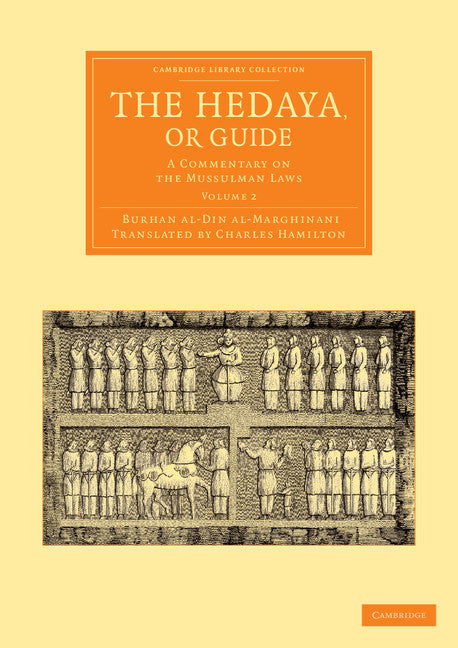Freshly Printed - allow 8 days lead
Couldn't load pickup availability
The Hedaya, or Guide
A Commentary on the Mussulman Laws
This 1791 four-volume English translation of a key text of Islamic law illuminates the East India Company's legal provision.
Charles Hamilton (Translated by), Burhan al-Din al-Marghinani (Author)
9781108055369, Cambridge University Press
Paperback / softback, published 28 February 2013
742 pages
29.7 x 21 x 3.8 cm, 1.75 kg
Composed in the twelfth century by the leading Muslim jurist Burhan al-Din al-Marghinani (1135–97), the original Arabic al-Hid?yah remains a central text of Islamic personal law. This English translation, from a Persian version of the work, was prepared by the orientalist Charles Hamilton (c.1752–92) for the East India Company in 1791. Although since superseded, it remains a fascinating document in the history of colonial jurisprudence. The legal system was central to the entrenchment of British rule in India, providing the framework for active control of civil administration and the courts. Translations of Islamic texts were intended to remove the language barrier for colonial officials, and blurred British and native law for the first time. Volume 2 contains sections on punishments, larceny, the rules of war, foundlings, the absconding of slaves, missing persons, partnerships, sales, bail, the transfer of debts, the duties of judges, and evidence.
Part VII. Of Hodood, or Punishments: 1. Of zinna, or whoredom
2. Of the carnal conjunction which occasions punishment
3. Of evidence to whoredom, and of retraction therefrom
4. Of hidd shirb, or the punishment for drinking wine
5. Of hidd kazaf, or the punishment for slander
6. Of tazeer, or chastizement
Part VIII. Of Saraka, or Larciny: 1. Introductory
2. Of thefts which occasion amputation, and of thefts which do not occasion it
3. Of hirz, or custody
4. Of the manner of cutting off the limb of a thief
5. Of the acts of a thief with respect to the property stolen
6. Of katta-al-tareek, or highway robbery
Part IX. Al Seyir, or the Institutes: 1. Introductory
2. Of the manner of waging war
3. Of making peace
4. Of plunder and the division thereof
5. Of the conquests of infidels
6. Of the laws concerning moostamins
7. Of tithe and tribute
8. Of jizyat, or capitation-tax
9. Of the laws concerning apostates
10. Of the laws concerning rebels
Part X. Of the Laws Respecting Lakeets, or Foundlings
Part XI. Of Looktas, or Troves
Part XII. Of Ibbak, or the Absconding of Slaves
Part XIII. Of Mafkoods, or Missing Persons
Part XIV. Of Shirkat, or Partnership
Part XV. Of Wakf, or Appropriations
Part XVI. Of Sale: 1. Introductory
2. Of optional conditions
3. Of option of inspection
4. Of option from defect
5. Of invalid, null, and abominable sales
6. Of akala, or the dissolution of sales
7. Of moorabihat and tawleeat
8. Of ribba, or usury
9. Of rights and appendages
10. Of claims of right
11. Of sillim sales
Part XVII. Of Sirf Sale
Part XVIII. Of Kafalit, or Bail: 1. Introductory
2. Of bail in which two are concerned
3. Of bail by freemen in behalf of slaves, and by slaves in behalf of freemen
Part XIX. Of Hawalit, or the Transfer of Debts
Part XX. Of the Duties of the Kazee: 1. Introductory
2. Of letters from one kazee to another
3. Of arbitration
4. Of the decrees of a kazee relative to inheritance
Part XXI. Of Shahadit, or Evidence: 1. Introductory
2. Of the acceptance and rejection of evidence
3. Of the disagreement of witnesses in their testimony
4. Of evidence relative to inheritance
5. Of attestation of evidence
Part XXII. Of Retractation of Evidence.
Subject Areas: Asian history [HBJF]


